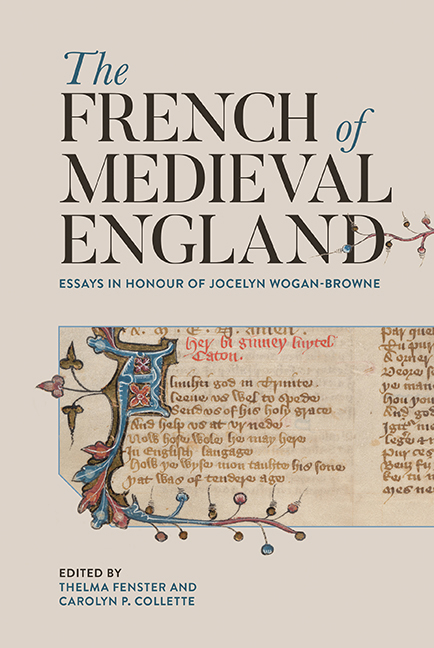Book contents
- Frontmatter
- Contents
- List of Illustrations
- List of Contributors
- List of Abbreviations
- Foreword: ‘The Light I Never Left Behind’: Jocelyn Wogan-Browne
- Introduction: Recognizing the French of Medieval England
- 1 The Gloss to Philippe de Thaon's Comput and the French of England's Beginnings
- 2 The Scandals of Medieval Translation: Thinking Difference in Francophone Texts and Manuscripts
- 3 Contrafacture and Translation: The Prisoner's Lament
- 4 Complaining about the King in French in Thomas Wright's Political Songs of England
- 5 The Chanson d’Aspremont in Bodmer 11 and Plantagenet Propaganda
- 6 The Use of Anglo-Norman in Day-to-Day Communication during the Anglo-Scottish Wars (1295–1314)
- 7 Middle English Borrowing from French: Nouns and Verbs of Interpersonal Cognition in the Early South English Legendary
- 8 William Langland Reads Robert Grosseteste
- 9 Disability Networks in the Campsey Manuscript
- 10 English Women and Their French Books: Teaching about the Jews in Medieval England
- 11 French Residents in England at the Start of the Hundred Years War: Learning English, Speaking English and Becoming English in 1346
- 12 French Immigrants and the French Language in Late-Medieval England
- 13 Fashioning a Useable Linguistic Past: The French of Medieval England and the Invention of a National Vernacular in Early Modern France
- 14 Admiring Ambivalence: on Paul Meyer's Anglo-Norman Scholarship
- 15 Twenty-First Century Gower: The Theology of Marriage in John Gower's Traitié and the Turn toward French
- 16 Royaumes sans frontières: The Place of England in the Long Twelfth Century
- Afterword
- Bibliography
- Index
- Publications of Jocelyn Wogan-Browne
- Tabula Gratulatoria
4 - Complaining about the King in French in Thomas Wright's Political Songs of England
Published online by Cambridge University Press: 12 August 2020
- Frontmatter
- Contents
- List of Illustrations
- List of Contributors
- List of Abbreviations
- Foreword: ‘The Light I Never Left Behind’: Jocelyn Wogan-Browne
- Introduction: Recognizing the French of Medieval England
- 1 The Gloss to Philippe de Thaon's Comput and the French of England's Beginnings
- 2 The Scandals of Medieval Translation: Thinking Difference in Francophone Texts and Manuscripts
- 3 Contrafacture and Translation: The Prisoner's Lament
- 4 Complaining about the King in French in Thomas Wright's Political Songs of England
- 5 The Chanson d’Aspremont in Bodmer 11 and Plantagenet Propaganda
- 6 The Use of Anglo-Norman in Day-to-Day Communication during the Anglo-Scottish Wars (1295–1314)
- 7 Middle English Borrowing from French: Nouns and Verbs of Interpersonal Cognition in the Early South English Legendary
- 8 William Langland Reads Robert Grosseteste
- 9 Disability Networks in the Campsey Manuscript
- 10 English Women and Their French Books: Teaching about the Jews in Medieval England
- 11 French Residents in England at the Start of the Hundred Years War: Learning English, Speaking English and Becoming English in 1346
- 12 French Immigrants and the French Language in Late-Medieval England
- 13 Fashioning a Useable Linguistic Past: The French of Medieval England and the Invention of a National Vernacular in Early Modern France
- 14 Admiring Ambivalence: on Paul Meyer's Anglo-Norman Scholarship
- 15 Twenty-First Century Gower: The Theology of Marriage in John Gower's Traitié and the Turn toward French
- 16 Royaumes sans frontières: The Place of England in the Long Twelfth Century
- Afterword
- Bibliography
- Index
- Publications of Jocelyn Wogan-Browne
- Tabula Gratulatoria
Summary
We are increasingly inclined to see oral and written use of French in medieval England as a capability open to many, rather than something reserved to a privileged few. In considering the political poetry of the twelfth and thirteenth centuries we have moved well beyond Thomas Wright's suggestion that complaint in French was a brief post-Conquest deviation shared among courtiers, separate from the larger tradition of popular complaint by ‘the people with their good old English’. Rather than a succession of disparate political and legal languages, each the province of a particular social class, from English to Latin to French then back to ‘good old English’, we now see languages and their speakers as overlapping and intermingling. Some words inhabit all three languages; some are newly imported from one language to another to supplement a technical vocabulary; many have vernacular meanings in everyday life but also specialized senses within a particular realm of competency, whether law or commerce or shipbuilding. In some settings language choice may well have been constrained by convention or by the competencies of speaker or audience, but for the highly literate trilingual clerics who wrote and revised and recopied the poems we will examine here, complaining in French was a choice. French allowed them the greatest latitude to address political and legal ideas that had until then mainly been discussed in Latin, yet that were figured by a key term and concept at home in all three languages: consent.
To be sure, consent was (and is) an everyday word as well as a juridical term, and ordinary and legal discourses could find themselves in contact over precisely this term, as for example in the treatment of marriage cases in the ecclesiastical courts. The same is true of any number of other words, as William Rothwell has observed: medieval poetry in French is replete with a legalizing vocabulary whose resonances can be missed by the modern reader because it emerges as a specialized use of ordinary language. Some words pass fluidly between languages, not always separately anchored by language-specific spelling or morphology, especially in overtly mixed-language contexts: the Assize of Clarendon, for example, a legal document recorded in Latin, consists largely of French loan-words, as William Rothwell has pointed out.
- Type
- Chapter
- Information
- The French of Medieval EnglandEssays in Honour of Jocelyn Wogan-Browne, pp. 82 - 99Publisher: Boydell & BrewerPrint publication year: 2017
- 1
- Cited by

